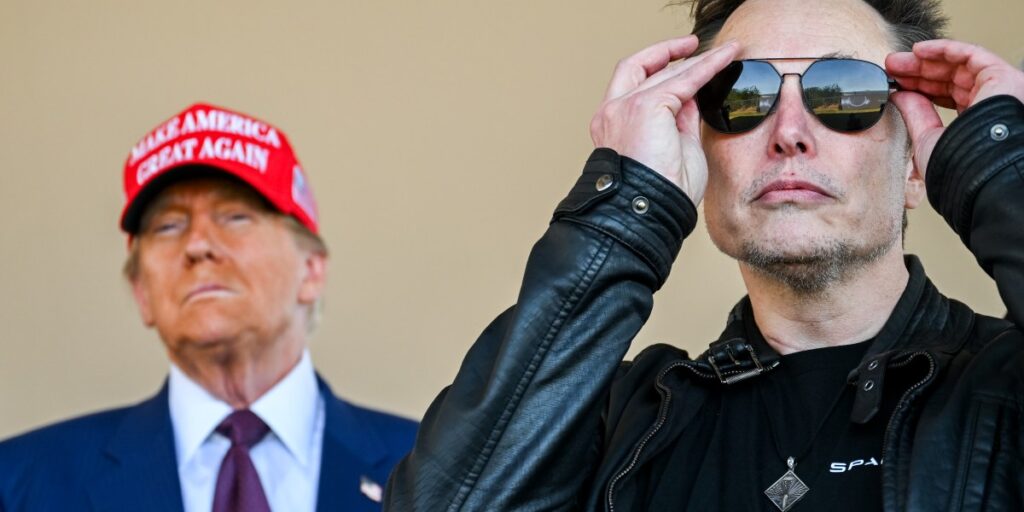Elon Musk has a new job doing something he knows a great deal about: firing people. Lots of people. Now he’s about to test his axing skills on the greatest downsizing challenge in American history.
He is co-head of the Department of Government Efficiency (DOGE), recently formed by President-elect Donald Trump to cut back government regulations, dismiss unneeded workers, and save money. Musk’s partner is Vivek Ramaswamy, a former biotech entrepreneur and candidate for the 2024 Republican presidential nomination. Their ambition is staggering. In a recent Wall Street Journal op-ed, they write that they anticipate “mass head-count reductions across the federal bureaucracy,” which will be their primary tool for cutting costs. Ramaswamy has suggested firing 75% of federal employees.
Musk looks like the ideal man for the job. He has sacked significant numbers of workers at SpaceX and Tesla—he’s CEO of both—but for sheer exuberant terminating, nothing can match his performance at Twitter. When he bought the company in 2022 he began mass layoffs within a week, firing thousands of the company’s 8,000 workers overnight. Some got the news by email. Others could only infer they were dismissed when they couldn’t log into the internal computer system the next morning. A few were even fired by accident and were brought back. In following months he cashiered more. Six months after taking over, Musk told the BBC he had reduced the staff by more than 80%.
It’s hard to tell exactly how X (as Musk renamed Twitter) has fared, since the company is no longer publicly traded, but signs aren’t promising. Fidelity owns a minority share of X and reports its estimated value. Based on Fidelity’s October estimate, X has lost 79% of its value since Musk took over.
Will Musk bring the Twitter playbook to America’s biggest employer, the federal government? It’s easy to picture Washington trembling at the thought. But as other captains of industry have found, government is different from the private sector in some peculiar ways. Here’s what Musk is up against.
· DOGE can’t make it happen. Musk could fire employees of his companies in an eyeblink because he was CEO (and at Twitter, also majority owner). But DOGE “doesn’t have any power,” says Douglas Holtz-Eakin, former director of the Congressional Budget Office and now president of the center-right American Action Forum. “They’re an outside advisory group who are going to generate ideas. They are essentially a very high-profile think tank.”
· Dismissals depend on regulatory rollbacks. DOGE’s stated procedure is to identify federal regulations that appear to be invalid under two Supreme Court decisions, from 2022 and 2024. President Trump will then nullify “thousands of such regulations,” Musk and Ramaswamy say in their op-ed. Fewer regulations mean a lighter workload and fewer employees. But while Trump can “immediately pause the enforcement of those regulations,” they note, he must then “initiate the process of review and rescission,” which can take a year or more and may not happen at all. Many regulations have constituencies with a voice in what happens. Bottom line, some regulations don’t succumb easily.
· Dismissals, even if successful, won’t save much money. Musk and Ramaswamy emphasize that cost savings are central to their mission, but labor costs are a small part of federal spending. The vast majority of what government spends goes out the door in the form of benefits—Social Security, veterans’ benefits, food stamps, and many more. All those benefits have powerful constituencies and are extremely difficult to reduce. Payrolls are not where the money is. Brian Riedl, a Washington-based economist who has been a Senate staffer and has worked for Republican officeholders, says, “If you eliminate 25% of all federal jobs, you would save roughly 1% of federal spending.” Not that he thinks a 25% job reduction will happen. “I don’t think it’s remotely workable to reduce the federal workforce by 20%, much less the 75% that Vivek Ramaswamy promises,” he says.
· Federal workers will fight back. About one million federal employees belong to unions, says the Bureau of Labor Statistics, and they are already preparing to take on the Trump administration. Trump has said he will impose an employee category called Schedule F, reclassifying career civil service employees as political employees, who lack civil service protections and can be fired quickly. Several government unions are trying to protect their members from being classified as Schedule F by appealing to the federal Office of Personnel Management and the Merit Systems Protection Board. Even if the unions lose, they may be able to throw sand in the gears.
Musk and Ramaswamy say their “top goal for DOGE is to eliminate the need for its existence by July 4, 2026—the expiration date we have set for our project.” Ostensibly that is to celebrate DOGE’s work as America celebrates its 250th anniversary. Practically, it’s to leave six months with Republican control of Congress in case DOGE’s work requires legislation. Musk is accustomed to doing large-scale firings in days, but he’ll likely need every moment he’s got to accomplish the layoff of a lifetime.
How many degrees of separation are you from the globe’s most powerful business leaders? Explore who made our brand-new list of the 100 Most Powerful People in Business. Plus, learn about the metrics we used to make it.
